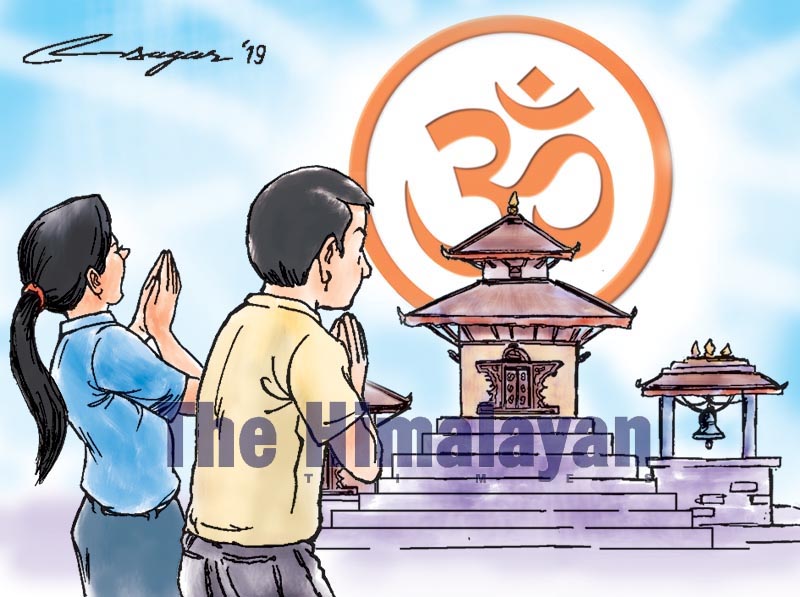A perspective on Hinduism: Good to know one’s religion
The core tenet of Hinduism is this idea of ‘pluralism’- the ultimate reality is one, but it is manifested in different forms. This perhaps explains why religious prosecution is rare in our part of the world
I was born and raised in Kathmandu and came to the US to continue my education. Like many Nepali youth with a Hindu background, I participated in festivals, visited temples but didn’t truly understand the essence of the religion, until I came to the US.
My college was in a small city in Iowa, the middle of the US, and we didn’t have any Hindu temples nearby. However, there were many churches, and I would visit church with some of my college friends who followed Christianity. I also visited a mosque to learn about Islam. At both the places of worship, I was given the religious texts - Bible and Quran. Having grown up in a religiously moderate household in Kathmandu, we never really read any religious texts. So, reading the Bible and the Quran made me feel like I had a structured path to spiritualism that Hinduism didn’t provide.
While some teachings of both religions were appealing, especially the Sermon on the Mount by Jesus Christ, still some aspects of these religions didn’t appeal to my spiritual yearning. Some core points in the Abrahamic religions contradicted general logic. One such example is that both Christians and Muslims believe that the earth was created roughly 4,000 years ago.
Similarly, the repercussion of apostasy (or ‘giving up one’s religion’) takes punishment to a whole new level. In Islam, people believe an apostate (who converts) should be punished by death. In Christianity and Judaism, an apostate goes directly to hell. It was at this point, I decided to understand Hinduism’s view on apostasy. A thorough research on this showed that in Hinduism, there is no idea or mention of apostasy. According to Hinduism, the atman (Atma) can neither be intimidated nor enticed to believe in one thing over the other. So, you believe what you want to believe. This was the first time I had ever thought about learning more about Hinduism, which turns out to be more liberal.
Among the many principles in Hinduism, the core tenet is this idea of ‘pluralism’- the ultimate reality is one, but it is manifested in different forms. As Rig Veda, the oldest text in Hinduism, describes it, ‘Truth is One, though the sages call it by different names”. This can help explain why religious prosecution is rare in our part of the world. It is this idea of acceptance of other faiths that has allowed the sub-continent to be a safe place for minority religions, such as Judaism and Parsi. A Hindu can never say to another person that their faith is wrong. One can attain moksha with the path that one considers fit for oneself. The path doesn’t even have to be theistic, for example, in Buddhism, there is no creator God, yet it is as equally a viable path to salvation as the path through Lord Krishna or any other Hindu manifestation of God. Unlike other holy books, including the Bible where Christ says in Luke 19:27- “..bring those enemies of mine who didn’t want me to reign over them here, and kill them before me”, in Hinduism you cannot prosecute people from other faiths. No wonder, Hindus or Jains or Buddhists don’t go around the world trying to convert people from other religions.
Another conceptual idea of Hinduism that many in the West have adopted over the last few decades is the idea of Karma - the notion that all of life is governed by a system of cause and effect. In Abrahamic religions, it doesn’t matter how sinful you are because as long as you believe in one of their holy books, you will be ‘saved’. In Hinduism, the path to moksha is not that easy. Your every action has consequences, both positive and negative. Even though it is a difficult path, it looks like the idea of Karma is actually what many people around the world believe in. A study conducted by a credible British research institution BMG showed that majority of the people in the UK believe in Karma.
The third core principle of Hinduism is the idea of God’s omnipresence. Hinduism believes that everything material and immaterial is part of God, and everything is connected. No wonder people worship animals, trees and even rivers. Unlike other religions, Sanatana Dharma doesn’t believe that God only created us (human beings) in his image. So the trees are also equally divine in nature. So, while pluralism and karma maybe something that will be easier for future generations to accept, the idea of omnipresence will take some time to become mainstream. Slowly but surely, humans will someday accept an animal and other living being’s life to have a much higher value than how they perceive it today.
Moreover, I was always open to the idea of learning from other religions, but can the same be said about practising Christians and Muslims who believe that only their path is right? The freedom in Hinduism allowed me to explore the teachings in other religious philosophies. In the West, people are now conceptually aligning themselves to pluralism, idea of karma and freedom from within their religions to practise or not to practice their religion. So, I think Nepal and Nepali youth should make themselves aware of what their own culture has to offer. Just like you wouldn’t want anyone else to define your identity, don’t let others define your religion. You are as much a part of this community as the greatest of sages and gurus who have walked on this earth!
Khadka is a graduate student in Finance at Boston College






